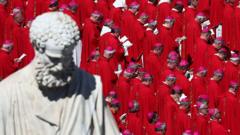As the Vatican gears up for the conclave to elect a new pope, 133 cardinals will enter a lockdown environment, swearing an oath of secrecy, while the world watches for insights and possible successors amid the unique blend of religion and politics.
The Vatican's Conclave: A Cloistered Quest for a New Pope

The Vatican's Conclave: A Cloistered Quest for a New Pope
A look inside the Vatican as 133 cardinals prepare for a secretive conclave to choose the next pope, complete with stringent isolation measures and media scrutiny.
Just over 130 cardinals are set to gather in the iconic Sistine Chapel later this week to participate in what is regarded as one of the most confidential electoral processes in existence. The conclave, commencing Wednesday, will see each of the 133 Catholic cardinals pledge an oath on the gospels to maintain the confidentiality of the proceedings for life. Additionally, every individual present at the Vatican—including medical personnel and kitchen staff—must adhere to the same vow of "absolute and perpetual secrecy."
To ensure the integrity of the election, the Sistine Chapel and its surrounding guesthouses will undergo thorough sweeps to detect any listening devices. John Allen, editor of the Crux news site, emphasizes the Vatican's seriousness regarding this isolation, stating that there are electronic jammers specifically designed to block any cellphone and Wi-Fi signals.
This total lockdown serves a dual purpose: it is designed not only to secure the secrecy of the voting process but also to prevent interference from "nefarious forces" looking to disrupt the elections or sway the voters. According to Allen, "The logic is trust but verify." Upon entering the conclave, the cardinals are required to relinquish all electronic devices, creating a bubble devoid of outside influence, as echoed by Monsignor Paolo de Nicolo, former head of the Papal household.
Communication among the cardinals during this period is strictly controlled, with only specific circumstances warranting the use of walkie-talkies for emergencies like medical assistance or notifying church bell-ringers of a new pope's election. Those who violate the oath face severe consequences, including ex-communication from the church.
In the lead-up to the conclave, speculation over potential papal successors has intensified. While official commentary is restricted, eager reporters and the Italian press are on the hunt for clues, examining the social movements of cardinals and their dining choices. Notably, a headline in La Repubblica dubbed "Wine and Rigatoni: the Cardinals' Last Suppers" highlights the informal gatherings of these religious leaders before the casting of votes.
Currently, approximately 250 cardinals are stationed in Rome, although not all are eligible to participate in the voting process. The discussions leading up to the conclave are marked by calls for unity, though distinct factions and influences from external media do seek to sway opinions on candidates.
The theological essence of the conclave posits that the Holy Spirit guides the decision-making, distancing the election from political themes, even though the pope ultimately leads a formidable institution wielding considerable global influence on moral and political issues.
While rumors and strategic maneuvering are present—historically referred to as "cardinal hunting"—the atmosphere remains controlled and elusive. Some cardinals, like Filipino Cardinal Tagle, have faced scrutiny and viral moments leading to conversations about their viability as candidates.
As the conclave approaches its start, John Allen believes that the cardinals' personal preferences will guide the vote rather than external pressures. Ines San Martin concludes that the discussions are crucial, remarking that the potential for inspiration among the cardinals might yield surprising results as they prepare for one of the most significant spiritual selections in the world.



















